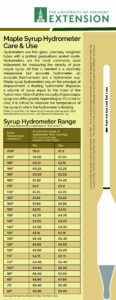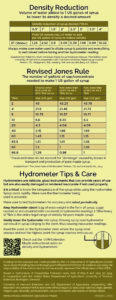Temperature Compensation Chart for Maple Syrup Hydrometers
The University of Vermont Extension’s “New” temperature compensation chart syrup hydrometers. 


Showing 1 – 10 of 12 resources
The University of Vermont Extension’s “New” temperature compensation chart syrup hydrometers. 


This ongoing podcast features interviews with researchers and educators about topics related to maple production and marketing.
A panel discussion at the NAMSC annual meeting offered a number of suggestions for ways state and provincial associations can help their members.
Overall, Bruce says he is positive and optimistic about both production and demand, estimating that both could double in the U.S. in the next decade or so. “Some people think it’s a bubble,” he says, “but I think the market is still very strong.”
Chart showing the range of labelling regulations used in different states and provinces.
Organizations grow and develop like children, animals or plants. Understanding organizational growth can help make sense of what is happening in maple producer organizations.
Some have questioned the accuracy of NASS’s Maple Syrup estimates. The most common criticisms typically include: some producers don’t return their report, some don’t report accurately, and some don’t receive a report. I will address each one separately.
Maple and the maple industry are synonymous with Vermont with its sugar houses and mountain sides with colorful leaves in the fall. The maple industry, beyond producing maple products, contribute to the image of Vermont and to its tourism. This report focuses on the economic contribution of the maple production supply chain from equipment manufacturing, equipment sales, installation to sugaring, packing and production of maple products. Though putting a dollar amount on the contribution of the maple industry to tourism in Vermont would be a complex task, and beyond the scope of this report, the contribution is likely very significant.
In October, in Green Bay, an informal needs assessment survey was conducted by Sumner Dole, Henry Marckres and Kathy Hopkins to identify the most pressing issues facing the maple industry.
Making maple syrup in the mild climate of southern Illinois is lesspredictable and more work. The sap seasons are longer, there is an almost certain need to freshen the tap holes, and the freeze-thaw cycles are less predictable.